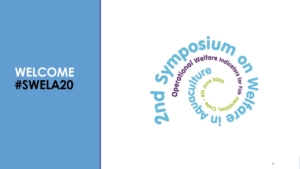 A total of 262 participants from 38 countries attended the Second Symposium on Welfare in Aquaculture. This year the symposium was delivered online on the 26th of November and focused on Operational Welfare Indicators (OWI) for salmon, lumpfish, tilapia, sea bass, and sea bream. The webinar is available on YouTube and the talks can be downloaded from the symposium website.
A total of 262 participants from 38 countries attended the Second Symposium on Welfare in Aquaculture. This year the symposium was delivered online on the 26th of November and focused on Operational Welfare Indicators (OWI) for salmon, lumpfish, tilapia, sea bass, and sea bream. The webinar is available on YouTube and the talks can be downloaded from the symposium website.
The symposium is a follow up from the very successful SWELA 2019, focusing on Welfare Indicators for Novel species. The number of farmed fish outnumbers by far any other sentient animals farmed for food.
A recent report by the Access2Sea project highlighted that consumers are starting to realize how their food is produced; consumers more sensitive to the welfare of animals and the wellbeing of workers – fish welfare in aquaculture is extremely important.
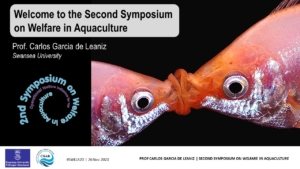 The Director of CSAR, Professor Carlos Garcia de Leaniz, at Swansea University, welcomed the participants and highlighted three main reasons for hosting this second symposium: the increasing awareness of fish welfare, the link between fish welfare and fish health, and the need for operational welfare indicators (OWIs) that can be used by fish farmers.
The Director of CSAR, Professor Carlos Garcia de Leaniz, at Swansea University, welcomed the participants and highlighted three main reasons for hosting this second symposium: the increasing awareness of fish welfare, the link between fish welfare and fish health, and the need for operational welfare indicators (OWIs) that can be used by fish farmers.
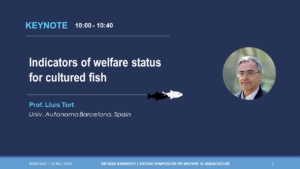 Prof. Lluis Tort of the Autonomous University of Barcelona presented a keynote talk on Indicators of Welfare Status for Cultured Fish. Professor Tort explained the real challenges for measuring welfare in farmed fish and noted that despite fish being the most “used” animals worldwide (30,000 million/year), their welfare needs are the least well known. It was also highlighted that most scientists, and also the majority of consumers (73%) , now accept that fish can feel pain.
Prof. Lluis Tort of the Autonomous University of Barcelona presented a keynote talk on Indicators of Welfare Status for Cultured Fish. Professor Tort explained the real challenges for measuring welfare in farmed fish and noted that despite fish being the most “used” animals worldwide (30,000 million/year), their welfare needs are the least well known. It was also highlighted that most scientists, and also the majority of consumers (73%) , now accept that fish can feel pain.
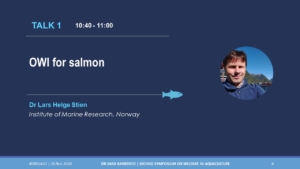 Dr. Lars Helge Stien, of the Institute of Marine Research, focused on OWI for salmon and explained the challenges of measuring welfare in a cage environment with thousands of individuals; he also explained the different welfare indicators and the merits of having clear decision flow-charts and 3-alert levels which are relevant for fish farmers.
Dr. Lars Helge Stien, of the Institute of Marine Research, focused on OWI for salmon and explained the challenges of measuring welfare in a cage environment with thousands of individuals; he also explained the different welfare indicators and the merits of having clear decision flow-charts and 3-alert levels which are relevant for fish farmers.
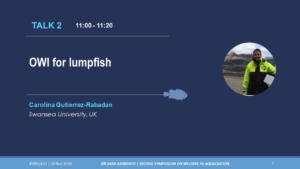 The OWIs for lumpfish were discussed by Carolina Gutierrez-Rabadan of CSAR – Swansea University. She explained the challenges of defining welfare for novel farmed species such as the lumpfish and provided examples of the importance of measuring the reliability in OWIs, and the need for simplification and validation. Carolina presented a practical Lumpfish Operational Welfare Score Index (LOWSI) and highlighted that most lumpfish she sampled in salmon farms were in good condition (70%) with only 2% in poor welfare status.
The OWIs for lumpfish were discussed by Carolina Gutierrez-Rabadan of CSAR – Swansea University. She explained the challenges of defining welfare for novel farmed species such as the lumpfish and provided examples of the importance of measuring the reliability in OWIs, and the need for simplification and validation. Carolina presented a practical Lumpfish Operational Welfare Score Index (LOWSI) and highlighted that most lumpfish she sampled in salmon farms were in good condition (70%) with only 2% in poor welfare status.
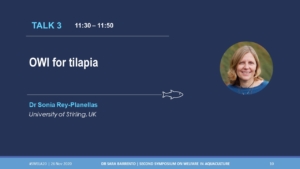 Dr. Sonia Rey Planellas of Stirling University pointed out that there are few or no OWIs for tilapia, which is the second most important farmed fish in the world. Tilapia is farmed mostly in developing countries where welfare needs may not always be a priority. Another challenge is the complex social behaviour and aggression shown by this species
Dr. Sonia Rey Planellas of Stirling University pointed out that there are few or no OWIs for tilapia, which is the second most important farmed fish in the world. Tilapia is farmed mostly in developing countries where welfare needs may not always be a priority. Another challenge is the complex social behaviour and aggression shown by this species
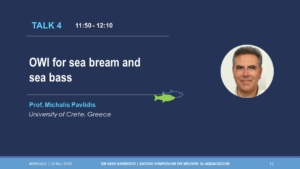 Professor Michalis Pavlidis, of the University of Crete, discussed the different welfare challenges posed by sea bass and sea bream at different production stages; he highlighted the need to keep the temperature within optimal limits as a key welfare consideration for these very important Mediterranean farmed fish. Professor Pavlidis highlighted the big improvements that the industry has made to make slaughtering more humane.
Professor Michalis Pavlidis, of the University of Crete, discussed the different welfare challenges posed by sea bass and sea bream at different production stages; he highlighted the need to keep the temperature within optimal limits as a key welfare consideration for these very important Mediterranean farmed fish. Professor Pavlidis highlighted the big improvements that the industry has made to make slaughtering more humane.
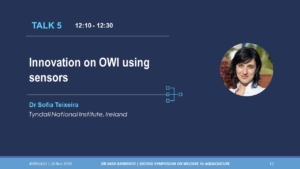 Dr. Sofia Teixeira of Tyndall Institute in Ireland presented non-invasive, rapid tests using smart sensors which can be used to monitor health by measuring indicators such as cortisol and other parameters that have wide applications in the assessment of immune competence, stress, growth, and behaviour.
Dr. Sofia Teixeira of Tyndall Institute in Ireland presented non-invasive, rapid tests using smart sensors which can be used to monitor health by measuring indicators such as cortisol and other parameters that have wide applications in the assessment of immune competence, stress, growth, and behaviour.
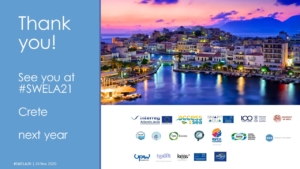 The Symposium ended with Prof. Carlos Garcia de Leaniz summarizing the talks and inviting attendants to the next Symposium on Welfare in Aquaculture which will be hosted in Crete in 2021.
The Symposium ended with Prof. Carlos Garcia de Leaniz summarizing the talks and inviting attendants to the next Symposium on Welfare in Aquaculture which will be hosted in Crete in 2021.
Text and images by Dr Sara Barrento
Centre for Sustainable Aquatic Research, Swansea University

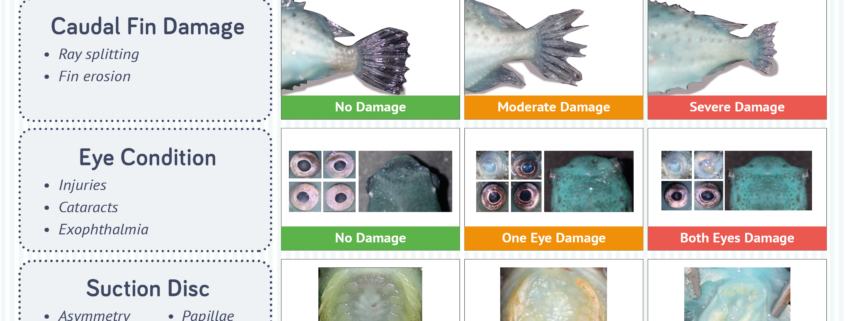
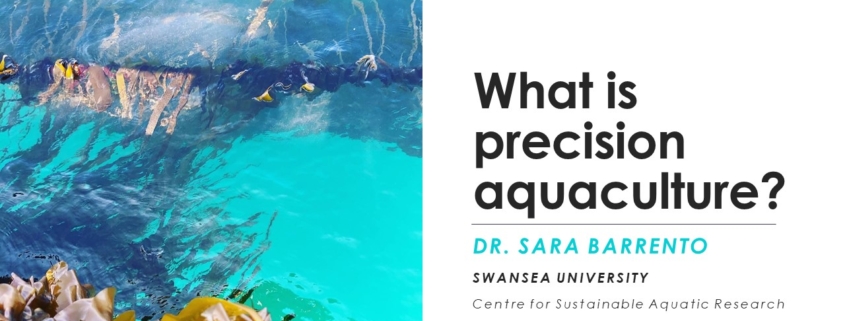
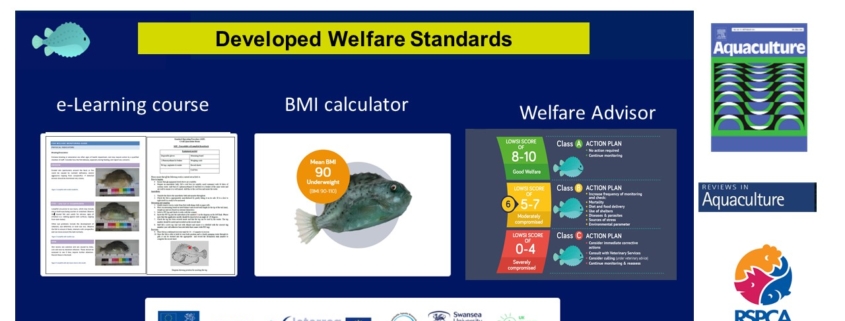
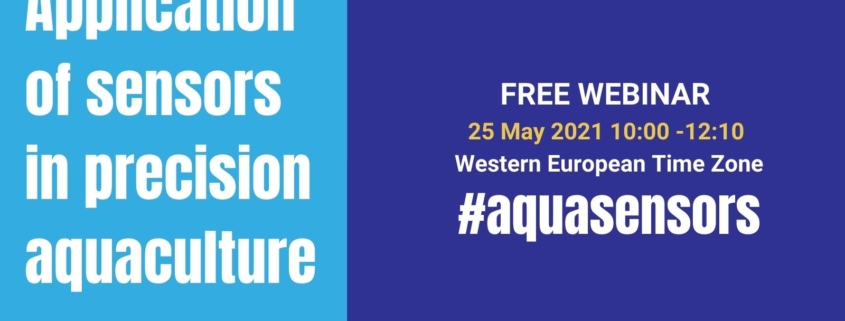
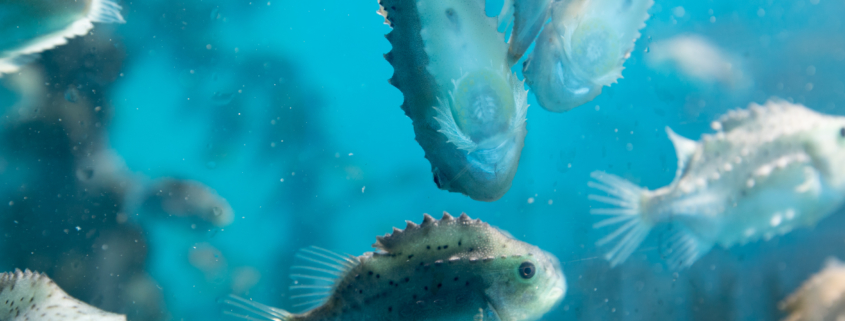
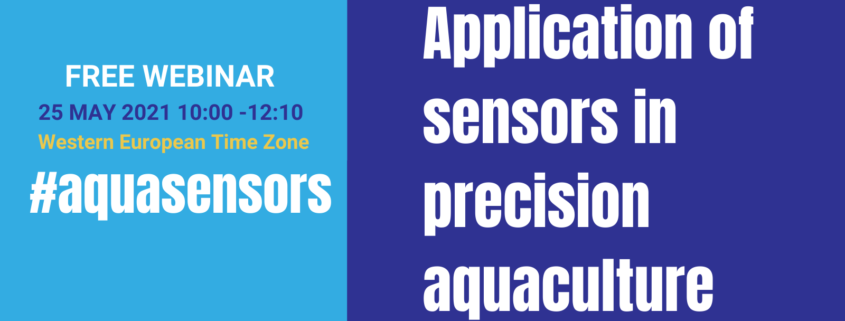
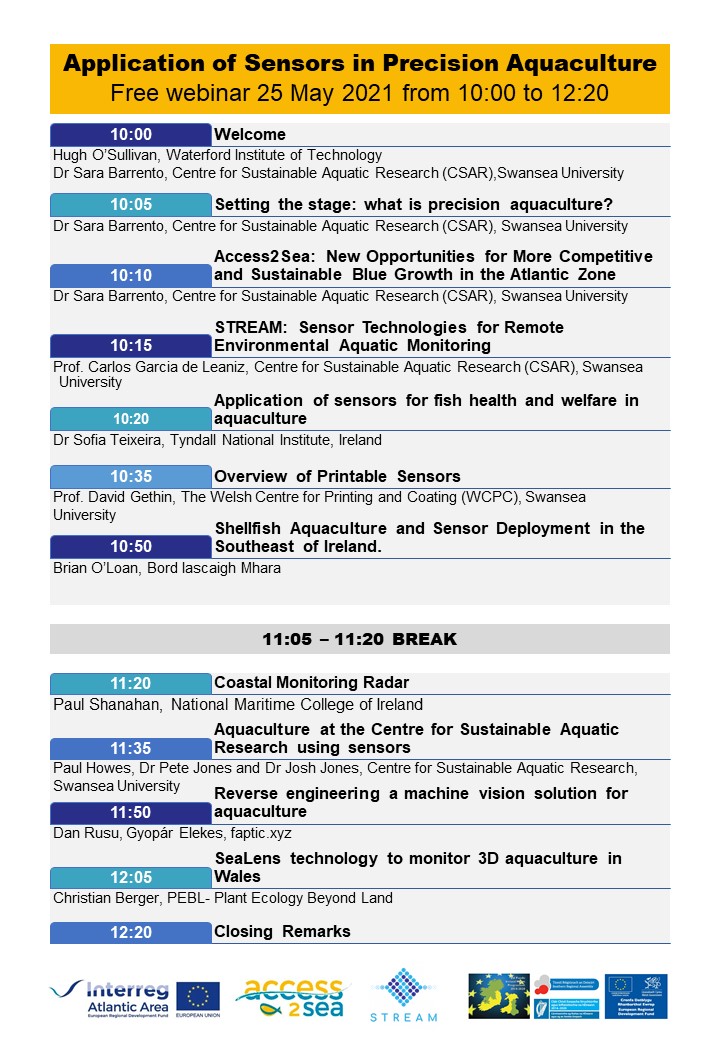
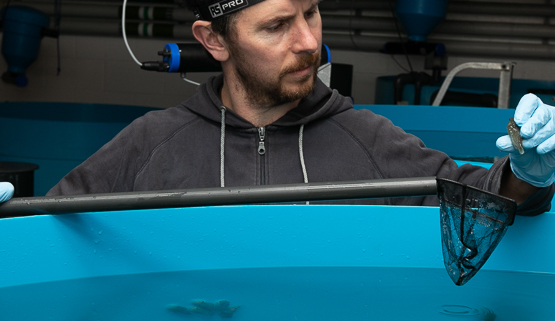
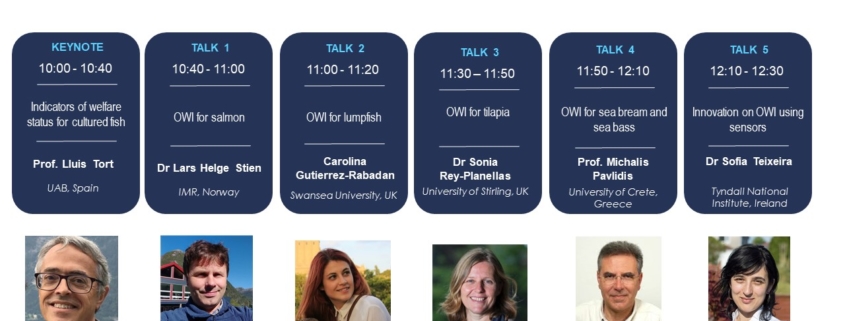
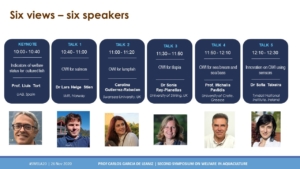 The
The 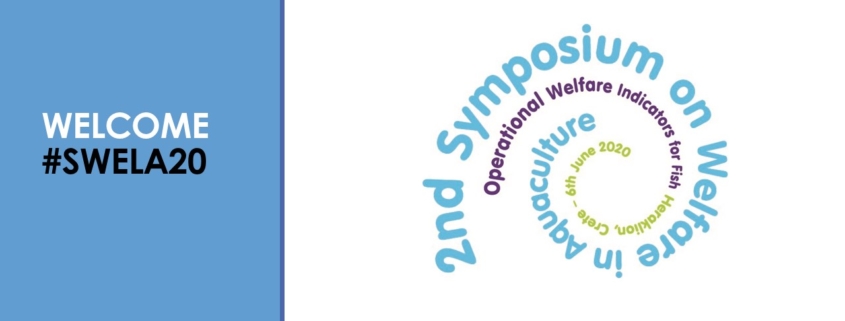
 A total of 262 participants from 38 countries attended the Second Symposium on Welfare in Aquaculture. This year the symposium was delivered online on the 26th of November and focused on Operational Welfare Indicators (OWI) for salmon, lumpfish, tilapia, sea bass, and sea bream. The webinar is available on
A total of 262 participants from 38 countries attended the Second Symposium on Welfare in Aquaculture. This year the symposium was delivered online on the 26th of November and focused on Operational Welfare Indicators (OWI) for salmon, lumpfish, tilapia, sea bass, and sea bream. The webinar is available on  The Director of CSAR, Professor Carlos Garcia de Leaniz, at Swansea University, welcomed the participants and highlighted three main reasons for hosting this second symposium: the increasing awareness of fish welfare, the link between fish welfare and fish health, and the need for operational welfare indicators (OWIs) that can be used by fish farmers.
The Director of CSAR, Professor Carlos Garcia de Leaniz, at Swansea University, welcomed the participants and highlighted three main reasons for hosting this second symposium: the increasing awareness of fish welfare, the link between fish welfare and fish health, and the need for operational welfare indicators (OWIs) that can be used by fish farmers. Prof. Lluis Tort of the Autonomous University of Barcelona presented a keynote talk on Indicators of Welfare Status for Cultured Fish. Professor Tort explained the real challenges for measuring welfare in farmed fish and noted that despite fish being the most “used” animals worldwide (30,000 million/year), their welfare needs are the least well known. It was also highlighted that most scientists, and also the majority of consumers (73%) , now accept that fish can feel pain.
Prof. Lluis Tort of the Autonomous University of Barcelona presented a keynote talk on Indicators of Welfare Status for Cultured Fish. Professor Tort explained the real challenges for measuring welfare in farmed fish and noted that despite fish being the most “used” animals worldwide (30,000 million/year), their welfare needs are the least well known. It was also highlighted that most scientists, and also the majority of consumers (73%) , now accept that fish can feel pain. Dr. Lars Helge Stien, of the Institute of Marine Research, focused on OWI for salmon and explained the challenges of measuring welfare in a cage environment with thousands of individuals; he also explained the different welfare indicators and the merits of having clear decision flow-charts and 3-alert levels which are relevant for fish farmers.
Dr. Lars Helge Stien, of the Institute of Marine Research, focused on OWI for salmon and explained the challenges of measuring welfare in a cage environment with thousands of individuals; he also explained the different welfare indicators and the merits of having clear decision flow-charts and 3-alert levels which are relevant for fish farmers. The OWIs for lumpfish were discussed by Carolina Gutierrez-Rabadan of CSAR – Swansea University. She explained the challenges of defining welfare for novel farmed species such as the lumpfish and provided examples of the importance of measuring the reliability in OWIs, and the need for simplification and validation. Carolina presented a practical Lumpfish Operational Welfare Score Index (LOWSI) and highlighted that most lumpfish she sampled in salmon farms were in good condition (70%) with only 2% in poor welfare status.
The OWIs for lumpfish were discussed by Carolina Gutierrez-Rabadan of CSAR – Swansea University. She explained the challenges of defining welfare for novel farmed species such as the lumpfish and provided examples of the importance of measuring the reliability in OWIs, and the need for simplification and validation. Carolina presented a practical Lumpfish Operational Welfare Score Index (LOWSI) and highlighted that most lumpfish she sampled in salmon farms were in good condition (70%) with only 2% in poor welfare status. Dr. Sonia Rey Planellas of Stirling University pointed out that there are few or no OWIs for tilapia, which is the second most important farmed fish in the world. Tilapia is farmed mostly in developing countries where welfare needs may not always be a priority. Another challenge is the complex social behaviour and aggression shown by this species
Dr. Sonia Rey Planellas of Stirling University pointed out that there are few or no OWIs for tilapia, which is the second most important farmed fish in the world. Tilapia is farmed mostly in developing countries where welfare needs may not always be a priority. Another challenge is the complex social behaviour and aggression shown by this species Professor Michalis Pavlidis, of the University of Crete, discussed the different welfare challenges posed by sea bass and sea bream at different production stages; he highlighted the need to keep the temperature within optimal limits as a key welfare consideration for these very important Mediterranean farmed fish. Professor Pavlidis highlighted the big improvements that the industry has made to make slaughtering more humane.
Professor Michalis Pavlidis, of the University of Crete, discussed the different welfare challenges posed by sea bass and sea bream at different production stages; he highlighted the need to keep the temperature within optimal limits as a key welfare consideration for these very important Mediterranean farmed fish. Professor Pavlidis highlighted the big improvements that the industry has made to make slaughtering more humane. Dr. Sofia Teixeira of Tyndall Institute in Ireland presented non-invasive, rapid tests using smart sensors which can be used to monitor health by measuring indicators such as cortisol and other parameters that have wide applications in the assessment of immune competence, stress, growth, and behaviour.
Dr. Sofia Teixeira of Tyndall Institute in Ireland presented non-invasive, rapid tests using smart sensors which can be used to monitor health by measuring indicators such as cortisol and other parameters that have wide applications in the assessment of immune competence, stress, growth, and behaviour. The Symposium ended with Prof. Carlos Garcia de Leaniz summarizing the talks and inviting attendants to the next Symposium on Welfare in Aquaculture which will be hosted in Crete in 2021.
The Symposium ended with Prof. Carlos Garcia de Leaniz summarizing the talks and inviting attendants to the next Symposium on Welfare in Aquaculture which will be hosted in Crete in 2021.